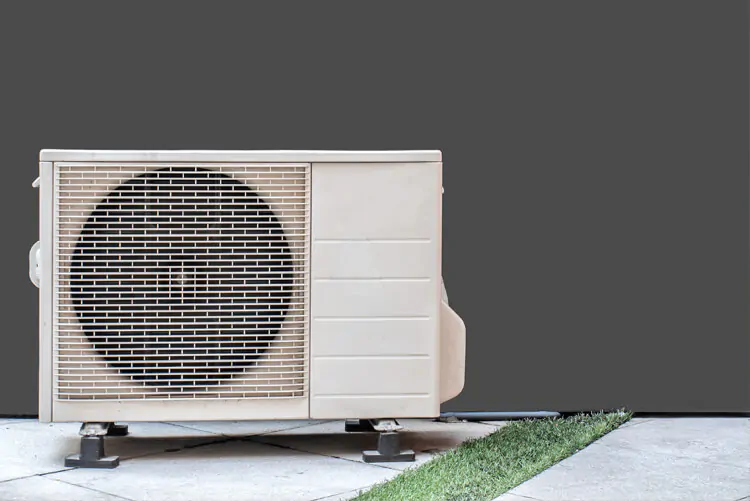How Does an Air to Water Heat Pump Work?
Air to water heat pumps utilise the air outside your home, turning it into a water-based system that can heat your home. There are many different types of air source heat pumps on the market, but air to water heat pumps are regarded as the most efficient. These heat pumps work best in moderate climates like the U.K. and are becoming a popular option for homeowners looking to save money and do their bit to protect the planet.
Selecting the right type of heat pump for your house depends on many factors including how old your house is, the size of it, and the space you have available. They can be installed in new builds or fitted to older buildings to make heating them more efficient. Let’s take a closer look:

Are Air to Water Heat Pumps Efficient?
Air to water heat pumps use renewable energy meaning that it is dramatically more efficient than traditional gas boilers when heating your home. Heat pumps do run on electricity however they do not produce carbon dioxide and are over three times more efficient than conventional heating. Estimates suggest that by swapping to a heat pump you can reduce your home is carbon footprint by up to 50%.
What to Consider When Installing Air Heat Pumps?
If you are considering installing a heat pump in your home, there are a few questions to consider:
Do you have the space to install a heat pump?
Firstly, it is important to identify why do you have space on both the inside and outside your home to install a heat pump. Externally, you need a well-ventilated area where the air can be circulated through your machine, with space for it to ventilate after it has been used. Therefore, it cannot be placed in a narrow or enclosed area. Inside your house, your water pump can be placed in a large cupboard or utility room, but you will need a floor drain.
Can you locate your heat pump away from the quiet parts of your home?
Heat pumps can be slightly noisier than other methods to heat your home. Therefore, it is important that you choose a location where it can be stored away from your main living space so that you cannot hear it. Although they are not very noisy, heat pumps generate around 30 to 60 dB of noise when measured a metre away. Heat pump installation specialists are aware of this and will be able to recommend where in your home is best to place the internal part of the heat pump. It is also important to note that the noise generated depends on the size of heat pump that you require, with larger heat pumps having a faster fan speed which means that they will be slightly noisier.
Do you have a hot water cylinder already in your home?
It is also worth identifying if you will need to install a water tank in your home, or if you already have one. This is because many standard heat pumps don’t provide lots of hot water on demand like you would expect from a combi boiler. Therefore, to store the hot water until you need to use it, you will need space for a water cylinder or an existing one that could be repurposed. There are many different sizes of cylinder depending on how much hot water you use, with the average size fitting inside a standard cupboard size of 80cm by 80cm.
If you don’t have this space, there are hybrid systems available or alternative options such as heat batteries. Your installer will be able to advise on this.

How to Maintain Air to Water Heat Pumps
In order to make your heat pump as efficient as possible for as long as possible, property maintenance is required. The outdoor section of your heat pump needs to be cleared of any debris in order to filter the air correctly. This will ensure that your heat pump is both efficient and increases its life span. There is a filter in the external part of the heat pump which should be cleaned regularly as this, in turn, means that the water it is producing is clear. If the outside part of the heat pump is kept clear of debris, then damage is more likely to be avoided.
Internally, the heat pump should be kept dry and clean. Your water tank should also be frequently maintained, especially if the water quality in your area means you frequently need to descale household items such as your kettle. If this is the case then your water tank may also need to be cleaned with scale. To avoid any damage, check the water tank often for any small leaks, rectifying them before they become a big problem.
How Much Does It Cost To Install An Air To Water Heat Pump?
There is no set cost when it comes to installing a heat pump in your home as it depends on a number of variables. The size of your property and how much space you have to heat will determine the size of the heat pump you require which will have an impact on the overall price. Additionally, the type of property that you have will also impact the cost.
New builds keep the heat in better than older houses, which may also need to be reconfigured to fit a heat pump. A general guide price for installing a heat pump is between £7000 and £13,000. To find out more, and get a personalised quote for your home, contact us today.

Will An Air To Water Heat Pump Save Me Money?
As mentioned above, every home is different but what we can say is that heat pumps will save you money on your energy bills. How much again depends on how your heat pump is installed and what type of system it is replacing. Your installers may be able to give you a better idea of this when they survey your home.
